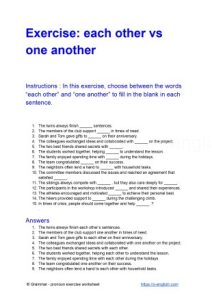Each other vs One another: What’s the Difference?
“Each other” and “one another” are both phrases used to indicate a reciprocal relationship between two or more entities. While they are often used interchangeably, there is a subtle difference in their traditional usage, So, let’s explore ‘each other‘ vs ‘one another‘:
Each Other:
- Typically used when referring to two entities (people, things, or groups).
- Example: “Alice and Bob love each other.”
- It suggests a mutual interaction between two individuals or items.
One Another:
- Generally used when referring to more than two entities (people, things, or groups).
- Example: “The team members support one another.”
- It implies a mutual interaction among a group of individuals or items.
In practice, many people use “each other” and “one another” interchangeably, and in modern English, the distinction between the two is becoming less strict. However, if you want to adhere to traditional usage, you can use “each other” for pairs and “one another” for groups.
Example where both can be used:
- “The students helped each other with their homework.”
- “The team members supported one another during the project.”
Remember that in contemporary English, the choice between “each other” and “one another” is often a matter of personal preference, and the distinction is not as rigid as it once was.
For a deeper understanding of reciprocal pronouns, be sure to read “How to Use reciprocal Pronouns“
Let’s practice
Difficulty Level : Intermediate / Proficient / Advanced / Skilled
Instructions : In this exercise, choose between the words “each other” and “one another” to fill in the blank in each sentence.
Exercises : ‘each other‘ vs ‘one another‘
- The twins always finish ______ sentences.
- The members of the club support ______ in times of need.
- Sarah and Tom gave gifts to ______ on their anniversary.
- The colleagues exchanged ideas and collaborated with ______ on the project.
- The two best friends shared secrets with ______.
- The students worked together, helping ______ to understand the lesson.
- The family enjoyed spending time with ______ during the holidays.
- The team congratulated ______ on their success.
- The neighbors often lend a hand to ______ with household tasks.
- The committee members discussed the issues and reached an agreement that satisfied ______.
- The siblings always compete with ______ , but they also care deeply for ______.
- The participants in the workshop introduced ______ and shared their experiences.
- The athletes encouraged and motivated ______ to achieve their personal best.
- The hikers provided support to ______ during the challenging climb.
- In times of crisis, people should come together and help ______ .
Answers
- The twins always finish each other’s sentences.
- The members of the club support one another in times of need.
- Sarah and Tom gave gifts to each other on their anniversary.
- The colleagues exchanged ideas and collaborated with one another on the project.
- The two best friends shared secrets with each other.
- The students worked together, helping each other to understand the lesson.
- The family enjoyed spending time with each other during the holidays.
- The team congratulated one another on their success.
- The neighbors often lend a hand to each other with household tasks.
- The committee members discussed the issues and reached an agreement that satisfied one another.
- The siblings always compete with each other, but they also care deeply for one another.
- The participants in the workshop introduced one another and shared their experiences.
- The athletes encouraged and motivated each other to achieve their personal best.
- The hikers provided support to each other during the challenging climb.
- In times of crisis, people should come together and help one another.
